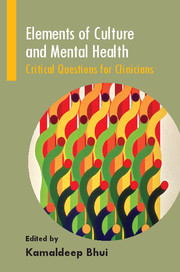Book contents
- Frontmatter
- Contents
- List of contributors
- Foreword: Desire and commitment: essential ingredients in learning about culture and mental illness
- 1 Is trauma-focused therapy helpful for survivors of war and conflict?
- 2 Will ethnopsychopharmacology lead to changes in clinical practice?
- 3 Does cognitive–behavioural therapy work for people with very different cultural orientations and backgrounds?
- 4 Can you do meaningful cognitive–behavioural therapy through an interpreter?
- 5 Are particular psychotherapeutic orientations indicated with specific ethnic minority groups?
- 6 Can psychotherapeutic interventions overcome epistemic difference?
- 7 On the role of culture and difference in evaluation, assessment and diagnosis
- 8 Necessary and sufficient competencies for intercultural work
- 9 On the validity and usefulness of existing Eurocentric diagnostic categories
- 10 Benefits and limitations of the cultural formulation in intercultural work
- 11 Barriers to the intercultural therapeutic relationship and how to overcome them
- 12 How does intercultural interpretation work in the mental health setting?
- 13 Do the power relations inherent in medical systems help or hinder in cross-cultural psychiatry?
- 14 Recovery and well-being: a paradigm for care
- 15 Social perspectives on diagnosis
- 16 Public mental health and inequalities
- 17 Can you do psychotherapy through an interpreter?
- 18 Can race and racism be acknowledged in the transference without it becoming a source of therapeutic impasse?
- 19 Cultural competence: models, measures and movements
- 20 Religion, spirituality and mental health
- Index
19 - Cultural competence: models, measures and movements
Published online by Cambridge University Press: 01 January 2018
- Frontmatter
- Contents
- List of contributors
- Foreword: Desire and commitment: essential ingredients in learning about culture and mental illness
- 1 Is trauma-focused therapy helpful for survivors of war and conflict?
- 2 Will ethnopsychopharmacology lead to changes in clinical practice?
- 3 Does cognitive–behavioural therapy work for people with very different cultural orientations and backgrounds?
- 4 Can you do meaningful cognitive–behavioural therapy through an interpreter?
- 5 Are particular psychotherapeutic orientations indicated with specific ethnic minority groups?
- 6 Can psychotherapeutic interventions overcome epistemic difference?
- 7 On the role of culture and difference in evaluation, assessment and diagnosis
- 8 Necessary and sufficient competencies for intercultural work
- 9 On the validity and usefulness of existing Eurocentric diagnostic categories
- 10 Benefits and limitations of the cultural formulation in intercultural work
- 11 Barriers to the intercultural therapeutic relationship and how to overcome them
- 12 How does intercultural interpretation work in the mental health setting?
- 13 Do the power relations inherent in medical systems help or hinder in cross-cultural psychiatry?
- 14 Recovery and well-being: a paradigm for care
- 15 Social perspectives on diagnosis
- 16 Public mental health and inequalities
- 17 Can you do psychotherapy through an interpreter?
- 18 Can race and racism be acknowledged in the transference without it becoming a source of therapeutic impasse?
- 19 Cultural competence: models, measures and movements
- 20 Religion, spirituality and mental health
- Index
Summary
A few years ago, colleagues and I undertook a systematic review of the literature on cultural competence in mental healthcare (Bhui et al, 2007). This revealed many interpretations of the concept, from which we synthesised a composite definition of cultural competence as the set of skills and processes that enable mental health professionals to provide services that are culturally appropriate for the diverse populations that they serve. This set focused on professionally defined outcomes, and included attention to obvious language differences in the consultation, as well as to how culture influences attitudes, expressions of distress and help-seeking practices. Showing respect for the patient's cultural beliefs and attitudes was an important component, especially when their views opposed or differed from those of the professional. Emphasis was given to a genuine willingness and desire to learn about other cultures, rather than seeing such learning as a managerial requirement or an imposition. There is some hostility towards the notion of cultural competence, which suggests the belief that there is nothing more to be learnt. It might be thought that all psychiatrists should already possess the necessary skills, but we know that this is not the case. Many admit to needing help, courses and accreditation, and, were the skills and aptitudes already there, books such as this would be neither necessary nor attractive (Bennett et al, 2007).
The definitions indicate a common aim, to improve performance and increase the capabilities of staff providing services for people from ethnic minorities. A popular definition from the National Center for Cultural Competence (2006) in the USA reads:
‘Cultural competence requires that organizations:
• have a defined set of values and principles, and demonstrate behaviors, attitudes, policies and structures that enable them to work effectively cross-culturally.
• have the capacity to (1) value diversity, (2) conduct self-assessment, (3) manage the dynamics of difference, (4) acquire and institutionalize cultural knowledge and (5) adapt to diversity and the cultural contexts of the communities they serve.
• incorporate the above in all aspects of policy making, administration, practice, service delivery and involve systematically consumers, key stakeholders and communities.’
However, other brands of cultural competence have emerged (Bhui et al, 2012).
- Type
- Chapter
- Information
- Elements of Culture and Mental HealthCritical Questions for Clinicians, pp. 83 - 86Publisher: Royal College of PsychiatristsPrint publication year: 2013



